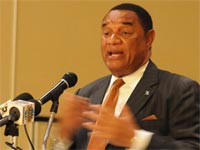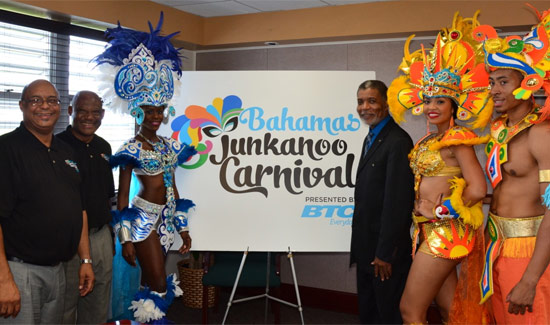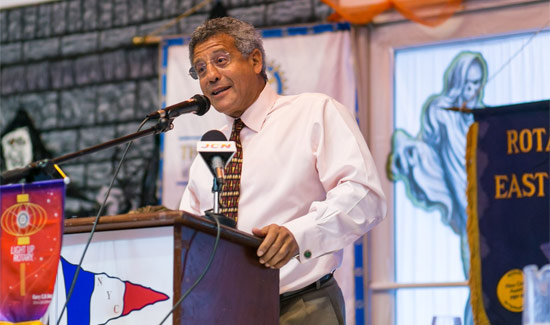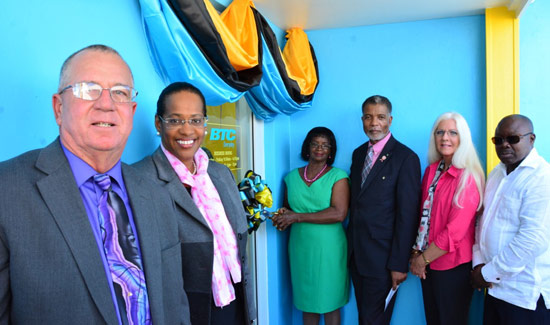
Prime Minister Perry Christie was elected on promises about fixing the country’s main social problems: crime and education. Any solutions for these deep-seated dilemmas will be long-term, and changes will only appear incrementally.
But he also stakes his reputation on three critical issues that will be resolved promptly: re-taking a majority position in Bahamas Telephone Company (BTC); a referendum on “numbers” gambling and a national lottery; and allowing oil exploration in Bahamian waters. Each of them is a high-stakes gamble that could make him appear brilliant or inept, determined or vacillating.
1. Mr. Christie has never taken a poll seeking Bahamians’ view about ownership of BTC, but since his election platform had a firm pledge that he would reverse the FNM’s sale of 51% to Cable & Wireless Communications, (CWC) he is determined to proceed, despite objections of the business community, fulminations from Moody’s rating agency and, perhaps, some doubts among his own cabinet and advisors. He is moving cautiously, stifling any bombast about oppressive foreign ownership. He has appointed a negotiating committee led by the consummate local entrepreneur Franklyn Wilson and vastly experienced lawyer Sean McWeeney – both PLP stalwarts who know how to negotiate calmly and shrewdly. They have a delicate mission, on the one hand mandated to get majority ownership of BTC back into Bahamian hands without paying a ruinous price or penalty for the crucial 2%, on the other hand determined to avoid CWC claiming breach of contract and putting our Government into the spotlight of international litigation or arbitration. Mr. Wilson’s recent press comments show his awareness of the “political risk” of the Bahamas earning a reputation as an unreliable business partner.
Once they face the CWC team, the negotiating committee may well find “middle ground” positions that satisfy both parties. One possibility: both Government and CWC sell shares of BTC to the Bahamian public in a ratio that leaves CWC as the largest single shareholder but places over 51% in the hands of Government combined with other Bahamian investors. Another expedient: Government acquires the 2% of BTC for a small down payment followed by installments earned out of BTC profits over the next ten years, with assurances that CWC can retain operational control and appoint the general manager. With ingenuity, there are many ways to skin this cat. While CWC assuredly would prefer no changes at all to the present status, the negotiating committee can point out that it’s in CWC’s best interest to maintain friendly relations with the country where they earn their biggest profits, even with only 49%.
2. Mr. Christie is our first Prime Minister to grasp the hot potato of the irrepressible “numbers” business, although very gingerly in fear of getting his fingers burnt. He has announced a referendum, but about what exactly? Will it simply ask whether the existing privately-run gambling ventures be licensed, regulated and taxed, or whether an official state lottery under Government control be created, or maybe both? Any choice will be controversial, but a decision must be made so that a comprehensible ballot can be put before our voters. As any experienced pollster can confirm, the exact wording of the ballot can be slanted to affect whether votes are pro or con. But how will the wording be drafted, given Mr. Christie’s adamant refusal to state his own preferences? He has said that, yes, he has an opinion but will only offer it privately, to avoid “influencing” the public. This seems an extraordinary abdication of political leadership, since the issue is not simply one of private faith and morals but a public one profoundly affecting our economic and social condition. He will not even lay the referendum before the House, telling all MPs that they can vote their conscience in the privacy of the ballot box, cravenly avoiding possible reproof from their pastor.
Mr. Christie need only look across to the United States to see how matters have been handled differently. Beginning with New Hampshire in 1964, some 42 states have now approved various forms of state lottery. In a few states such as Utah, with its dominant Mormon faith, the matter has never been put forward; in a few others a referendum led to lottery defeat. But it appears that every referendum, successful or not, was first approved by the state legislature, openly promoted by the current political leadership. Two cases illustrate what might happen in The Bahamas, the first a referendum in Alabama in 1999, and the second in South Carolina in 2000. Both states had a strong religious component, with evangelical Christians taking the lead in crusading for a “no” vote – indeed, South Carolina is called “the buckle of the bible belt”. Both the respective Governors were firmly and publicly in the pro-lottery camp, emphasizing how a lottery could meet the funding needs of education. A fascinating 100-page article can be found on the Internet titled “The Lotto and The Lord” describing the opposing arguments, and their effectiveness, disseminated in South Carolina’s months-long PR campaigns.
Despite their similarities, the two states split. Alabama voted “no” by a margin of 54%, with voters backing their religious principles with the view that state officials were too corrupt or incompetent to manage the lottery funds honestly. (And indeed Governor Don Siegelman was later convicted on unrelated federal corruption and bribery charges.) A year later South Carolina voted “yes” by 56%. The efforts of the clergy, together with citizens groups’ hostility towards the economic impact of lotteries, could not overcome the support of the popular Democratic Governor Jim Hodges..
Although these results may have reflected the different reputations of the two governors, they also reveal the unpredictable effect of clerical opposition to lotteries. How will our voters react to the vociferous views of segments of our fragmented religious community? The one certainty is that Mr. Christie will stand aloof, a decision that may come back to haunt him. If the referendum vote, however worded, is positive, he will be able to take little credit for it. If it’s negative, he will be pressured by the hard-line victors to undertake the long-awaited “crack-down”, deploying platoons of police and judges to permanently padlock all gaming premises, impose sentences, and seize the winnings, thus cutting jobs and angering thousands of citizens who wager as a harmless pastime – not a happy outcome for our genial Prime Minister.
As an ironic footnote to the gambling debate, Nassau’s most impressive commercial renewal project is largely the fruit of a technically illegal enterprise. The handsome four-story FML Building on Bay Street just west of the BC Hilton is owned by Mr. Craig Flowers, probably our most successful numbers entrepreneur. Beautifully restored from a derelict hotel, the structure with its surrounding greensward far surpasses any development efforts by “legitimate” downtown businesses owned by Bethells, Kellys, Pritchards or Symonettes. The gleaming lobby bears a bold wall inscription reading “EVERYBODY WINS!”. Maybe not everybody, but certainly our urban landscape.
3. Mr. Christie’s third gamble will be his decision about oil exploration by Bahamas Petroleum Company (BPC), incorporated in the Isle of Man with its shares listed in London and its operating headquarters right here in Mt. Pleasant Village. Until late last year BPC was quietly conducting seismic surveys of the geologic formations underlying the five areas licensed to it by our Government in 2007, but in the run-up to the elections it became a political football, with Prime Minister Ingraham denouncing its allegedly incestuous ties to the PLP and abruptly announcing cancellation of its licenses.
Now three months later, ambiguity reigns. BPC maintains that the licenses remain in full force since it has performed all its commitments required to date. The Christie Government still has made no official statement, but clearly is permitting BPC to continue its routine activities. The company has frequently confirmed its obligation to drill its first exploratory well by April 2013, but Mr. Christie has warned that Government must take further steps before permitting a shaft to be sunk. He has spoken of holding a referendum, or perhaps just a survey of public opinion. The Environmental Impact Assessment filed with the BEST Commission last October still awaits Government approval and public release. BPC has been urging Government to create a regulatory regime and train enforcement staff, but there’s been no announcement of any steps yet taken.
Mr. Christie’s latest statements suggest that he is waiting to see if drilling offshore Cuba in the coming months shows that oil is really present. But that is merely procrastination. The only way oil can be proven on Bahamian territory is by actual drilling on one of the five leases, located southwest of Andros. April 2013 is not far off, and BPC will soon need an OK from Government to give it enough lead-time to complete the technicalities, arrange financing and bring in a partner.
A referendum “in principle” would be a pointless exercise. Any intelligent vote must be based on review of complex factors that cannot be compressed into a referendum ballot – environmental risks, mitigation measures, revenue-sharing formulas, projections of future income – already being analyzed by BPC. They can be reviewed and negotiated by our Cabinet with its own team of technical, financial, and legal advisors, so that a detailed bill can be presented for debate by House and Senate.
Of course a certain faction of our citizens will campaign against oil exploration regardless of any information available, sincerely convinced that our beaches and waters will become fouled with oil slicks destroying our natural beauty and our tourist trade . Already the Re-Earth group led by Ms. Sam Duncombe has circulated a petition titled “No Oil, No Spoil” and obtained over 1,400 signatures, local and foreign. But the remainder of our populace can be shown that BPC is not a fly-by-night wildcatter but a serious, responsible enterprise committed to best practices. Its comprehensive 2011 Annual Report, discloses that its directors and senior executives all have long experience in either the oil and gas exploration and production industry or in high level banking or fund-management positions. In 2011 the company was capitalized by placing about $74 million of shares with sophisticated investors, firms capable of analyzing the inevitable risks of loss in hydro-carbon exploration and balancing them against the possible large rewards. After initial expenditures for exploration and evaluation assets, plus a year’s operating expense, about $35 million cash remained at year end, ample for continued business provided production revenues or farm-in investments are secured in the next few years.
The national earnings from hydro-carbons, as projected and still to be refined, clearly justify the minimal risks in permitting BPC to proceed. We must discount the cynicism of nay-sayers claiming that any new wealth will be wasted, mishandled, and only benefit rich insiders. The Bahamas, for all our imperfections, are not like the wretched West African nation of Equatorial Guinea, where cash from huge oil reserves discovered in the 1990s is sucked into the pockets of the ruling oligarch General Obiang, his profligate son, and a gang of cronies, leaving his 700,000 countrymen still mired in poverty and victimized by brutal repression of civil rights.
By contrast, if Mr. Christie handles this potential wisely, and the Cretacious geologic formations below our seas prove to hold the indicated reserves, he may well become known as the founder of a new era of Bahamian prosperity.
By: Richard Coulson
Nassau, The Bahamas
August, 2012



